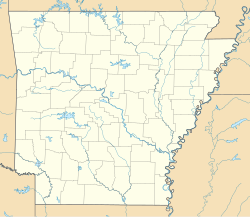School Addition Historic District: Difference between revisions
Added image |
|||
| Line 14: | Line 14: | ||
| long_direction = W |
| long_direction = W |
||
| coord_display = inline,title |
| coord_display = inline,title |
||
| locmapin = Arkansas |
| locmapin = Arkansas#USA |
||
| built = {{Start date|1850}} |
| built = {{Start date|1850}} |
||
| architect OR builder = Wyssel & Fitzhugh; et.al. |
| architect OR builder = Wyssel & Fitzhugh; et.al. |
||
Revision as of 16:46, 24 June 2016
School Addition Historic District | |
 | |
| Location | 560-770 Water, 210-293 N. 7th, 709-897 Rock, 215-280 N. 8th, Batesville, Arkansas |
|---|---|
| Area | 10 acres (4.0 ha) |
| Built | 1850 |
| Architectural style | Bungalow/craftsman, Queen Anne |
| NRHP reference No. | 06001315[1] |
| Added to NRHP | February 1, 2007 |
The School Addition Historic District encompasses a middle-class residential area of Batesville, Arkansas that typifies its growth between about 1850 and 1950. It is located between Main Street and Poke Bayou, along two blocks each of Rock and Water Streets (offset to give the district the shape of a parallelogram), and the intervening blocks of 7th and 8th Streets. Houses in this area are generally of a modest scale, built for tradesmen and craftsmen. They come in a variety of styles, including the traditional I-house, Craftsman-style bungalows, and ranches. The district was platted out in 1849 and sold off by the town to raise funds for public education.[2]
The district was listed on the National Register of Historic Places in 2007.[1] It includes two previously-listed properties: the Glenn House, and the Wycough-Jones House.[2]
See also
References
- ^ a b "National Register Information System". National Register of Historic Places. National Park Service. July 9, 2010.
- ^ a b "NRHP nomination for School Addition Historic District" (PDF). Arkansas Preservation. Retrieved 2015-08-08.


